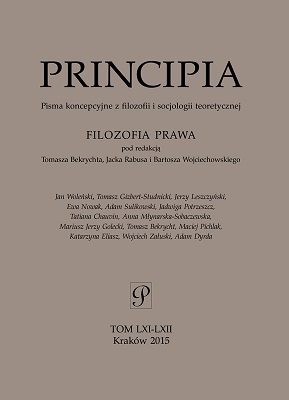Krytyczny pozytywizm prawniczy Kaarlo Tuoriego
The Critical Legal Positivism of Kaarlo Tuori
Author(s): Maciej PichlakSubject(s): Epistemology, Philosophy of Law, Sociology of Law
Published by: Wydawnictwo Uniwersytetu Jagiellońskiego
Keywords: Critical Legal Positivism; legal culture; critique of law; legitimacy of law;
Summary/Abstract: The aim of this article is to present Kaarlo Tuori’s theory of law termed Critical Legal Positivism (CLP). It outlines the fundamental claims of CLP with regard to law, conceiving law as a complex, dialectical concept combining the opposing (to some extent) elements described in legal tradition as ratio and voluntas (rational standards and political will). According to CLP, this complexity is best represented by a theoretical model of law as a multi-layered order, containing a surface layer (positive law), a legal culture and a ‘deep culture’. All three layers, according to a positivistic account, are regarded as socially created, yet they differ in their nature and in the way they come into being. A reconstruction of those layers is followed by analysis of the main functions of the deeper levels of legal order. On one hand, those deeper strata are said to discharge a limiting and critical role (they restrict the discretionary will of law-making and law-applying authorities); on the other, they constitute and legitimise positive law. By the same token, they serve as a medium between law and public opinion.
Journal: PRINCIPIA
- Issue Year: 2015
- Issue No: 61-62
- Page Range: 205-224
- Page Count: 20
- Language: Polish

